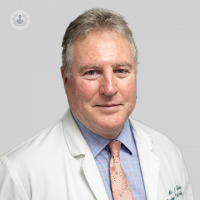How is sinus surgery (FESS) performed?
Written by:Sinuses are cavities within the forehead and facial bones around the eyes. Normally they open into the nasal passages via small drainage pathways called the ostia.
In cases in which antibiotics, nasal drops, sprays and decongestants have failed to clear any infection or problem, it is likely that the sinuses are physically obstructed and blocked. In this event, it may be advisable to undergo surgery to unblock these passages in the hope of restoring normal function by improving mucus drainage. This procedure is known as functional endoscopic sinus surgery (FESS).

What is the surgical procedure?
A decongestant is applied inside the nose to reduce bleeding and a fibre-optic instrument with a small camera (endoscope) is inserted. The image appears on a TV monitor in front of the surgeon and instruments can be seen on the TV when they are inserted in the nose. The surgeon’s eyes are fixed on the TV monitor while he operates inside the nose.
The diseased sinuses are identified and their bony walls are opened up step-by-step using special forceps. The bony partitions are not very thick and this is easily done. The natural passageways and paths of mucus drainage are enlarged to prevent blockage and diseased sinus lining (mucosa) is removed, although healthy mucosa is always left behind to speed up healing. Sometimes, the sinuses may be flushed out to wash away pus and debris etc.
At the end of the operation, instead of having a honeycomb-like labyrinth of sinuses (underlying the nasal bridge area), there is a single cavity that is widely opened into the nasal passageways so that it can drain freely. This does not weaken the nose at all.
When the operation is over, the surgeon often places some packing in the nose to arrest any continuous bleeding. This may be a dissolving gel-like substance, or it may be a gel-covered plug, which is removed later in the day, or the next day.
Often, additional procedures may be required, such as septoplasty, to straighten the midline nasal septal cartilage to allow access to the diseased sinuses, or sometimes turbinate reduction, to reduce nasal blockage if present. This is all done at the same time.
Will FESS surgery completely cure my sinus problem?
FESS is highly successful at improving the symptoms of sufferers of chronic sinusitis but it may not offer a permanent, complete cure because the mucus drainage mechanism has already been badly damaged by the infection.
Artificially-created pathways never work as well as natural ones but are better than none at all. For this reason, even after successful surgery, the patient will be more prone to bouts of sinus trouble than the average person, but usually, this will still be better than if they had never had their sinus operation.
Most often, even if sinusitis recurs in somebody who has had FESS, it can be brought under control medically (rather than surgically) using various antibiotics, sprays/drops, decongestants or anti-inflammatory steroids. Thus overall, most patients who undergo FESS although not completely cured, are a lot better.
If you are concerned about chronic sinusitis book with a specialist.


